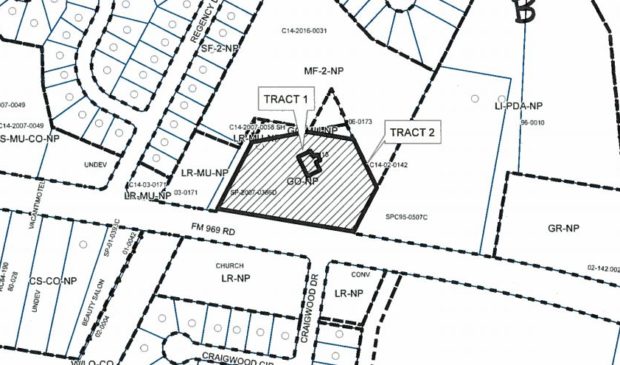Mosaic Sound Collective one step closer to East Austin campus
Friday, August 25, 2017 by
Joseph Caterine Tuesday night, the Planning Commission voted to approve recommendations for the rezoning of a property in East Austin that would allow for the expansion of a local music collective’s campus, despite some commissioners’ wariness of how the upzoning might attract development less amenable to Austin’s endangered resident artists.
Mosaic Sound Collective, a for-profit/nonprofit hybrid formed to help preserve Austin’s music culture in the midst of the city’s rapid growth, currently runs a modest operation of offices in what used to be a juvenile detention facility at 6400 FM 969. During the hearing, Commissioner Chito Vela jokingly said that he had heard the building was “haunted.”
Cursed or not, if City Council approves the upzoning of the property from general office to commercial mixed use, Mosaic co-founder Chris “Curse” Mackey said he and other collective members have big dreams for turning the space into something “magical.” “(Our intention) is to create a legacy for the Austin music community,” Mackey said at the meeting.
If the rezoning goes through, the Mosaic campus will feature extensive recording and rehearsal studios, a small indoor performance stage and even a cafe. Agent Alice Glasco, representing the collective, explained that higher zoning was necessary to make the project happen both because it would make the property comply with the neighborhood’s future land use map, and it would also allow the collective to run a screen printing business in-house.
“We are looking to be the first vinyl press in the history of Austin,” Mackey said.
Consultant Stephen Ray, speaking in support of the rezoning, said that the Mosaic vinyl press could provide a reliable income source to seal the project’s financial future in a challenging industry. Moreover, Stephen Easley, collective co-founder and attorney, said that the commercial mixed use zoning was necessary in order to satisfy the lenders who will finance the project.
Property owner Jimmy Nassour has offered the collective a lease-purchase contract that would give them the option to buy the property within five years, if they are able to meet an agreed-upon price.
The conundrum that always troubles zoning commission deliberations, however, is that projects often don’t go as planned. As much as all commissioners expressed excitement for the collective’s expansion, some cautioned that if the campus did not prove to be economically tenable, the property may be subjected to more intense redevelopment. Commissioner Nuria Zaragoza pointed out the differences in site development standards between general office and commercial. Impervious cover restrictions would jump from 60 to 95 percent, the floor area ratio would double and the setback would shrink.
“At some point, we are jeopardizing what we are hoping will be on this site, if the value of the land is such that it doesn’t make sense to have an artist (campus) there,” Zaragoza said.
Commissioners James Shieh and Trinity White echoed Zaragoza’s concerns, calling for some sort of safeguard. Commissioner Karen McGraw made a motion to approve staff’s recommendation with the condition that the property retain its current site development standards, seconded by Commissioner Angela De Hoyos Hart.
Collective members reaffirmed their belief that the project would come to fruition, basing their optimism largely on the compassion of the owner, who Easley said had been “extremely supportive.” Mackey asserted that this case would not turn into an episode of “Flipping Austin.”
As a property owner, however, Nassour has made the news for lucrative east side deals, most notably when he and others sold 500 Bastrop Highway, formerly home to Cactus Rose Mobile Home Park, to luxury apartment developer Oden Hughes.
Still, Chair Stephen Oliver said that he could not imagine a better location for commercial mixed use. “This is effectively a core transit corridor on the other side of 183,” he said.
In the end, Commissioner James Schissler made a substitute motion to approve the original staff recommendation, seconded by Vela. The motion passed 7-4, with commissioners Zaragoza, Shieh, White and McGraw dissenting.
The Austin Monitor’s work is made possible by donations from the community. Though our reporting covers donors from time to time, we are careful to keep business and editorial efforts separate while maintaining transparency. A complete list of donors is available here, and our code of ethics is explained here.
You're a community leader
And we’re honored you look to us for serious, in-depth news. You know a strong community needs local and dedicated watchdog reporting. We’re here for you and that won’t change. Now will you take the powerful next step and support our nonprofit news organization?



